
Urgent care facilities have become essential to the healthcare system, providing a quick and efficient alternative for those needing immediate medical attention. They bridge the gap between primary care doctors and emergency rooms, addressing various health concerns requiring timely intervention but not life-threatening. Understanding what urgent care can help with is crucial for patients seeking convenient and accessible healthcare solutions.
This blog post will outline what urgent care can help with by examining the common conditions treated at these facilities, the various injuries they can address, and the non-emergency illnesses that can be effectively managed. Whether you’re dealing with a minor ailment or an unexpected injury, knowing the capabilities of urgent care can save you time and ensure you receive the appropriate care when you need it most.
Urgent care facilities are designed to provide immediate medical care for various health issues that don't require a visit to an emergency room. They reliably treat common conditions such as colds, flu, and stomach bugs. Many people seek treatment for infections, including urinary tract infections, sinusitis, and bronchitis, which can develop suddenly and require prompt attention. Urgent care is an excellent option for those experiencing minor ailments that need swift responses to avoid further complications, providing a more accessible and cost-effective alternative to traditional healthcare settings.
In addition to respiratory and gastrointestinal issues, urgent care centers effectively manage skin conditions like rashes, insect bites, and minor allergic reactions. They also address other common concerns, such as seasonal allergies and acute migraine headaches. With extended hours and the ability to walk in without an appointment, urgent care facilities offer a convenient solution for individuals who need to quickly manage these everyday health concerns.
Urgent care facilities are equipped to handle a variety of injuries that require prompt medical attention but are not severe enough to necessitate a visit to the emergency room. Common injuries treated include sprains, fractures, and strains. When individuals experience a sudden twist or fall, they may present symptoms such as swelling and pain, which urgent care providers can evaluate and treat. Medical professionals at these facilities often use X-rays to diagnose fractures and can provide splints or casts to immobilize the injured area, ensuring proper healing.
Urgent care centers treat musculoskeletal injuries, cuts, lacerations, and puncture wounds. Prompt care is essential to prevent infection and promote optimal healing. Urgent care providers can apply stitches, perform minor surgical procedures, and offer tetanus vaccinations when necessary. By addressing these injuries quickly and efficiently, urgent care facilities help patients return to their daily activities with minimal downtime, further solidifying their role as a vital healthcare resource for non-life-threatening injuries.
Urgent care facilities are equipped to address a wide range of non-emergency illnesses, providing timely and effective treatment for patients who require immediate attention but do not need to visit an emergency room. These centers frequently evaluate and treat conditions such as fever, sore throat, and mild asthma attacks. Patients often seek care for common illnesses like colds, the flu, and gastrointestinal issues, as urgent care provides a convenient alternative to waiting for a primary care appointment. The trained staff can diagnose and manage these conditions efficiently, allowing patients to return to regular activities sooner.
Additionally, urgent care centers often offer services for minor infections, such as urinary tract infections (UTIs) and skin rashes. The medical professionals on-site can prescribe medications, conduct laboratory tests, and provide follow-up care when necessary. Visiting an urgent care facility allows patients to access essential treatments without the extensive wait times associated with emergency departments. This streamlining of care alleviates patient discomfort and enhances overall healthcare efficiency by reserving emergency services for true emergencies.
If yes, trust the medical experts team at Tooele Valley Urgent Care. We are open late seven days a week, and we specialize in providing quick and reliable medical assistance for any concern. You can learn more about our services online or contact us to speak to a professional today.